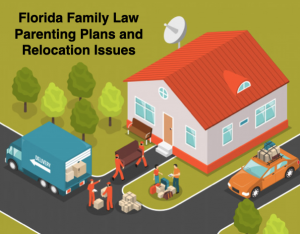 Family law cases are constantly evolving and changing, because like as children grow and change, their needs and the needs of the parents also change. In some instances, parents find that they have to move to a different state for a new job, better opportunities, or for a new marriage. When parents have divorced or have a Parenting Plan from a paternity case, where they share a minor child, when these changes occur, it’s important that you are aware of the limitations and procedures that you need to follow in order to make sure that you are following the Court’s previous orders in your case to be successful in attempting to move.
Family law cases are constantly evolving and changing, because like as children grow and change, their needs and the needs of the parents also change. In some instances, parents find that they have to move to a different state for a new job, better opportunities, or for a new marriage. When parents have divorced or have a Parenting Plan from a paternity case, where they share a minor child, when these changes occur, it’s important that you are aware of the limitations and procedures that you need to follow in order to make sure that you are following the Court’s previous orders in your case to be successful in attempting to move.
In some cases, co-parents have good communication and can understand how a different location can be better for the family as a whole. For example, if the Mother and Father have had a Parenting Plan for their child in Jacksonville, Florida, where they share time with their child equally, and the Mother is offered a job in Knoxville, Tennessee, where she can make double when she is making now, and the area that she is moving to offers a better educational system for their child, she can file to relocate to Knoxville with the minor child. If she and the Father can come to an agreement on how they will continue to co-parent their child, and share time and responsibility, even in light of the child moving to Knoxville, then the parties may be able to come to an agreement that can be approved by the assigned Judge on their case.
Obviously, in a situation like this, when one parent has the opportunity to be able to better provide for their child, and also the new location would be better for the minor child, then it makes senses that the parties can agree and work out issues like timesharing, holidays, and child support. It is always better for parents and children when a family can work together.
 Jacksonville Divorce Lawyer Blog
Jacksonville Divorce Lawyer Blog


 The age of the “smart home” is undoubtedly upon us, and devices control our room temperature, change our television channels, and even tell our children stories. We have come to not only rely on their safety measures, but also embraced how they make our lives easier. At the same time, the smart home devices are keeping tabs on what we do, say, and where we are. Could Amazon’s Alexa help or hurt you in a family case?
The age of the “smart home” is undoubtedly upon us, and devices control our room temperature, change our television channels, and even tell our children stories. We have come to not only rely on their safety measures, but also embraced how they make our lives easier. At the same time, the smart home devices are keeping tabs on what we do, say, and where we are. Could Amazon’s Alexa help or hurt you in a family case? Back to school is an exciting and hectic time for families. New school, new classroom, new teacher, but what if the same old situation exists with your co-parent where communication has hurdles, challenges, and yes disputes? Some families seem to do it seamlessly, by splitting the supplies list, attending orientations together, and sharing in the excitement of a new beginning. Others have more difficulty.
Back to school is an exciting and hectic time for families. New school, new classroom, new teacher, but what if the same old situation exists with your co-parent where communication has hurdles, challenges, and yes disputes? Some families seem to do it seamlessly, by splitting the supplies list, attending orientations together, and sharing in the excitement of a new beginning. Others have more difficulty. The Florida Statute governing child support is
The Florida Statute governing child support is  Recently in the
Recently in the  Parties are able to file to dissolve their marriage on their own, without the assistance of legal counsel. This allows for many people who are unable to afford legal counsel to utilize the legal system and move forward with their desires of achieving a divorce. While legal counsel is not a necessity, it is an incredible asset to have. When a party represents themselves in a divorce, or in any legal case for that matter, they are presenting to the court that they are competent to act and represent their interests to the same level of an attorney. Therefore, they are attesting to the court that they are aware of the rules of evidence, the statutory considerations in their cases, defenses available, and statutory deadlines.
Parties are able to file to dissolve their marriage on their own, without the assistance of legal counsel. This allows for many people who are unable to afford legal counsel to utilize the legal system and move forward with their desires of achieving a divorce. While legal counsel is not a necessity, it is an incredible asset to have. When a party represents themselves in a divorce, or in any legal case for that matter, they are presenting to the court that they are competent to act and represent their interests to the same level of an attorney. Therefore, they are attesting to the court that they are aware of the rules of evidence, the statutory considerations in their cases, defenses available, and statutory deadlines. During a divorce parties must divide the assets and the liabilities accumulated during the course of their marriage. One of the first things they tend to divide is the personal property items. Parties typically divide this property based out of simple want and desire. But, often times they hit a roadblock, as there is inevitably an item that neither of them wants to give up. How are parties to resolve these conflicts when they reach this barrier? Parties who are agreeable with one another tend to approach these issues by engaging in a give and take type of negotiation. However, in the midst of the emotional split one party tends to concede on the item, due to simply wanting to resolve this issue and move forward. While an amicable split and division of personal property is ideal, this is typically not the normal set of circumstances. Thus, it is essential for parties entering into divorce to understand what the court will consider when they move forward with dividing your assets and liabilities in litigation.
During a divorce parties must divide the assets and the liabilities accumulated during the course of their marriage. One of the first things they tend to divide is the personal property items. Parties typically divide this property based out of simple want and desire. But, often times they hit a roadblock, as there is inevitably an item that neither of them wants to give up. How are parties to resolve these conflicts when they reach this barrier? Parties who are agreeable with one another tend to approach these issues by engaging in a give and take type of negotiation. However, in the midst of the emotional split one party tends to concede on the item, due to simply wanting to resolve this issue and move forward. While an amicable split and division of personal property is ideal, this is typically not the normal set of circumstances. Thus, it is essential for parties entering into divorce to understand what the court will consider when they move forward with dividing your assets and liabilities in litigation. Florida statutes require unmarried fathers to establish Paternity. While many parents believe merely signing a birth certificate is sufficient to establish rights to timesharing and parental responsibility regarding the child, it is not. I see many fathers who were never married to the mother of their child(ren) who act under the presumption that they have rights to see their child(ren), prior to legally establishing those rights. While each parent may not have the rights to timesharing with their children, each parent has a responsibility to support their children.
Florida statutes require unmarried fathers to establish Paternity. While many parents believe merely signing a birth certificate is sufficient to establish rights to timesharing and parental responsibility regarding the child, it is not. I see many fathers who were never married to the mother of their child(ren) who act under the presumption that they have rights to see their child(ren), prior to legally establishing those rights. While each parent may not have the rights to timesharing with their children, each parent has a responsibility to support their children. In Florida parents are responsible for the support of their children. This support is not limited to just emotional and physical support, but also extends to financial support. This financial support is regulated by
In Florida parents are responsible for the support of their children. This support is not limited to just emotional and physical support, but also extends to financial support. This financial support is regulated by